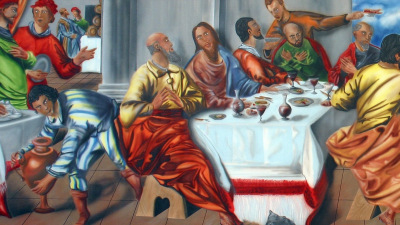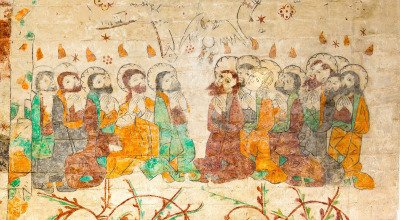Robert Wurtz II's Blog, page 21
November 9, 2018
Hidden Reefs that Cause Shipwreck
Hidden Reefs that Cause Shipwreck
Robert Wurtz II
Woe to them! For they walked in the way of Cain and abandoned themselves for the sake of gain to Balaam’s error and perished in Korah’s rebellion. These are hidden reefs at your love feasts, as they feast with you without fear, shepherds feeding themselves; waterless clouds, swept along by winds; fruitless trees in late autumn, twice dead, uprooted; wild waves of the sea, casting up the foam of their own shame; wandering stars, for whom the gloom of utter darkness has been reserved forever (Jude 1:11-13).
Our passage is situated in the context of Jude’s declaration that believers must “earnestly contending for the faith that was once and for all delivered unto the Saints.” In the first century, ungodly people came into the churches by stealth and turned the grace of God into license. The word “ungodly” indicates that they were unregenerate and devoid of the fear of God. Nevertheless, they made their way into the ministry and negatively influenced people under the guise of ministering for God.
The ESV translates this passage identifying these seducers as “hidden reefs” in the sea. The KJV and NKJV render them as “spots” which is not the sense or strong enough. The Greek word is spilas, and it means “rocks covered over by water” or a “reef.” Metaphorically it means to cause others to lose their faith. In other words, these spilas are instruments of a shipwreck. They lie under the surface and strike at the hidden and vulnerable parts of a ship as it comes into contact with them. Hence, they shipwreck other peoples’ faith.
Two Trappings
Jude gives two areas where these seducers stumble and therefore shipwreck others, the envious way of Cain and the greedy way of Baalim. This is lust for popularity with God and men and lust for money (covetousness). The reader will recognize that these two trappings spoiled many of the Pharisees and Sadducees.
The way of Cain is that of envy and jealousy. He was displeased that God favored his brother Abel’s offering above his. Envy turned to hate and then murder. The Pharisees watched the crowds that Jesus drew. He baptized more disciples than John the Baptist whom they had enviously hated before. John said, “I must decrease, and He must increase” but not them. They loved the chief seats and to hear the accolades of people.
The Pharisees and Sadducees wanted Jesus dead because He cut deeply into their fan base. They were prepared to ally with each other and even include the Zealots to bring Jesus down. Each group had their reasons for shouting “crucify,” but even Pilate had the good sense to perceive that it was out of envy that the chief priests had delivered him up” (Mark 15:10). As Dr. Joe Rigney has pointedly suggested:
“Envy hides behind a façade of care and compassion for others. When the Sanhedrin gather to discuss what to do about Jesus and his miraculous signs, they rationalize the need for action by concern for the people. “If we let him go on like this, everyone will believe in him, and the Romans will come and take away both our place and our nation” (John 11:48). Caiaphas seizes upon this reasoning and ironically prophesies that it is better for one man to die for the people, rather than the whole nation perish (John 11:49–50). Envy cannot bear to show its face, so it hides behind false pretenses. ‘It’s for the good of the people,’ rationalizes the high priest.”
False ministers such as these are dangerous to individual Christians and congregations. They are rocks under the surface of the waves waiting to tear the hull of the ship apart. Moreover, they, like the Pharisees, are covetous. In Luke 16:14 Jesus said that we cannot serve two masters (God and money). In the next verse, we read, “The Pharisees, who were lovers of money, heard all these things, and they ridiculed him” (Luke 16:14).
Jude is written much like the book of Galatians as a strong warning. The danger is what Paul calls “making shipwreck.” The behavior and teachings of such people can stumble a person (to use a different metaphor) or group until they abandon their faith, ministry, or both. Who are these stumbling blocks? (They) are hidden reefs at your love feasts, as they feast with you without fear, shepherds feeding themselves; waterless clouds, swept along by winds; fruitless trees in late autumn, twice dead, uprooted; wild waves of the sea, casting up the foam of their own shame; wandering stars, for whom the gloom of utter darkness has been reserved forever (Jude 1:12-13).
November 7, 2018
Jesus, the First Living Temple
Jesus, the First Living Temple
Robert Wurtz II
“Thus says the LORD: “Heaven is my throne, and the earth is my footstool; what is the house that you would build for me, and what is the place of my rest? All these things my hand has made, and so all these things came to be, declares the LORD. But this is the one to whom I will look: he who is humble and contrite in spirit and trembles at my word.” (Isaiah 66:1–2 ESV)
“Jesus answered and said to them, “Destroy this temple, and in three days I will raise it up.” (John 2:19 NKJV)
“Let this mind be in you which was also in Christ Jesus, who, being in the form of God, did not consider it robbery to be equal with God, but made Himself of no reputation, taking the form of a bondservant, and coming in the likeness of men. And being found in appearance as a man, He humbled Himself and became obedient to the point of death, even the death of the cross.” (Philippians 2:5–8 NKJV)
“But he answered, “It is written, “‘Man shall not live by bread alone, but by every word that comes from the mouth of God.’” (Matthew 4:4 ESV)
When the Lord Jesus walked the earth, He was the true Temple. He said it plainly in John 2:19, “Destroy this temple, and in three days I will raise it up.” Clearly, He was referring to the Temple of His body — a concept that was revolutionary at the time. Herod’s Temple, though magnificent, lacked the Ark of the Covenant and the Fire of God necessary to do the service of God. God was not there. He intended it to be a house of prayer but it was made into a den of thieves. By the end of the Lord’s earthly ministry, He was referring to Herod’s Temple as “your” house (Matt. 23:38, Luke 13:35).
When Jesus ascended into Heaven, He sent the Holy Spirit to take up residence in individual saints on the day of Pentecost. Men and womens’ physical bodies became living temples of the Holy Spirit (1 Cor. 6:19). Many people wonder, how did it happen? What is the secret to receiving the Holy Spirit in this way? There are no secrets in this regard, only explanations as to what God is looking for in a resting place. Isaiah 66:1-2 gives two essential clues:
1. One who is of a humble disposition.
2. One who trembles at God’s word.
The Lord Jesus had both of these in maximum abundance. He was the meekest man in the history of humanity. He had ultimate authority but refused to use that authority to save Himself when push came to shove. He was the God of the universe but humbled Himself down to the punishment of an insurrectionist (Barabbas) — cursed as He hung on a tree (the cross).
The Lord Jesus was so in agreement with God’s word and voice that He only did those things that He saw His father doing. His “food” was to do the will of God who sent Him. He lived by every word that God has written down and all that He impressed upon Him or spoke to Him by the Spirit. That is what it means to “tremble” at God’s word. We tremble at the word knowing that it is absolute. The Old and New Testament scriptures are not a compilation of ancient suggestions but are truths to be walked out with reverence and gladness. This is a crucial attitude.
For those who are seeking the indwelling of the Holy Spirit, there are three keys we must address:
1. Are you of a humble and meek disposition?
2. Do you tremble at God’s word?
3. Are you presently resisting the Holy Spirit?
Despite all of the study and dedication of the Pharisees, Stephen told Saul and the people with him that they did “… always resist the Holy Spirit.” A person could hold an earned doctorate of theology and still be in a state of resisting the Holy Spirit. Education has nothing to do with it. We have to want God to come into us. We have to humble ourselves before God and repent of our sinful ways. Once we have done all of these things, we have to invite Jesus in by the Holy Spirit earnestly.
November 5, 2018
Living With a New Heart
Living With a New Heart
Robert Wurtz II
And having a High Priest over the house of God, let us draw near with a true heart in full assurance of faith, having our hearts sprinkled from an evil conscience and our bodies washed with pure water” (Hebrews 10:21-22).
The writer to the Hebrews to this point has explained many great truths concerning the picture of the Old Covenant priesthood and how it relates to New Covenant life. Simply stated, the Wilderness Tabernacle and the Temple were illustrations of man in his relationship to God in the service of God. It is the kingdom of priests doing the service on earth under the authority and guidance of the throne of grace.
Picture the Wilderness Tabernacle and Temple as vertical and not horizontal. Imagine the High Priest ascending to Heaven through the vail on the Day of Atonement with the blood. For the priests, beginning at the entrance to the courtyard there was an altar where the fire of God burned continually. Next was the brazen laver that was lined with polished metal (like mirrors). It was at the laver where the priests were to wash before entering the Holy Place. The laver is of supreme importance because it represents the washing of regeneration and renewing of the Holy Spirit promised in Ezekiel (see Titus 3:5, Eph. 5:26).
“I will sprinkle clean water on you, and you shall be clean from all your uncleannesses, and from all your idols I will cleanse you. I will give you a new heart and put a new spirit within you; I will take the heart of stone out of your flesh and give you a heart of flesh. I will put My Spirit within you and cause you to walk in My statutes, and you will keep My judgments and do them” (Ezek. 36:25-27).
Ezekiel 36:25-27 is closely related to Jeremiah’s New Covenant promise (Jer. 31:31-34 cited in Heb 8:7-13; Heb 10:15-18). God has given to the regenerate a true heart that does by nature the principals of the Old Covenant law. The true heart is received in a crisis event and will require ongoing care and maintenance to maintain it as true. It can become defiled and hardened again if care is not taken.
In the same sense that receiving a new heart makes for a new tongue (for an explanation of this process see the previous blog post), receiving a new heart and maintaining that new heart will also keep our bodies cleansed. When the heart has changed the conduct of the tongue and body will be changed. It can be no other. The tongue and body are directly connected to the heart. If the heart is evil so will be the deeds of the tongue and body. The true heart (new heart) sets a totally different course for our life.
The true heart has been “sprinkled from an evil conscience freed from dead works to serve the living God” (Heb. 9:14). This is more than being purged of the sting of a transgressed conscience by the blood of Christ; it is the true heart that longs to live by every word that is proceeding from the mouth of God. It echoes the words of the Lord Jesus, “My food is to do the will of him who sent me and to accomplish his work” (John 4:34 ESV). God has written his laws upon the true heart as anticipated by Jeremiah and referenced in Heb. 10:16.
It is in this state of a true heart that we can draw near unto God, Holy, undefiled, cleansed from the Sin of Adam, and eye to eye with God. The writer uses the present continuous tense for drawing near (see Heb. 4:16; Heb. 7:25; Heb. 11:6). Drawing near to the Throne of Grace is the means of direction, enabling for service, Holy living, and perseverance until His appearing. In public and in private we are called to “draw near with a true heart in full assurance of faith, having our hearts sprinkled from an evil conscience, and our bodies washed with pure water” (Heb. 10:21-22).
November 4, 2018
Generational Spirits?
This article is well worth reading.
The title’s question mark gives away my conviction concerning this popular teaching.
It’s too long a message for a blog entry, so I’ve put it on my Other Writings page.
Here’s how it begins:
Let me lead into this subject by sharing my personal experience with a fellowship that used the term “familiar spirit” to refer to evil spirits that (according to this fellowship) entrench themselves in the families of mankind. For example, if Grandpa and Uncle Bill and cousin Jack are alcoholics, this is the work of a “familiar spirit,” and inevitably the new generation will grow up and be victimized by the same. Or, if Great Grandma and Grandma and Dad have heart disease or Alzheimer’s, this is no doubt the work of a “familiar spirit.”
The elders of this fellowship would sometimes visit the fellowship I was part of, bringing this teaching with them—to the point that…
View original post 74 more words
November 3, 2018
The Error of Not Discerning the Lord’s Body
Robert Wurtz II
For as often as you eat this bread and drink this cup, you proclaim the Lord’s death till He comes. Therefore whoever eats this bread or drinks this cup of the Lord in an unworthy manner will be guilty of the body and blood of the Lord. But let a man examine himself, and so let him eat of the bread and drink of the cup. For he who eats and drinks in an unworthy manner eats and drinks judgment to himself, not discerning the Lord’s body. For this reason many are weak and sick among you, and many sleep. For if we would judge ourselves, we would not be judged. But when we are judged, we are chastened by the Lord, that we may not be condemned with the world (1 Cor. 11:26–32 NKJV).
We learn from Ephesians 1:22-23 that the Church is the Lord’s body. Failing to discern between all other secular entities and the Lord’s body (the Church) is a dangerous misstep. The Greek word for discerning in 1 Cor. 11:29 above is used in many different ways. However, in Acts 15:9 it is used to express the difference between Jew and Gentile. This concept of “difference” hearkens back to Leviticus and Deuteronomy when God taught Israel the difference between clean and unclean, and holy and profane. That which is holy unto the Lord must be treated precisely as God prescribes.
A cursory reading of the Old Covenant scriptures reveals that many people were smitten dead, plagued with hemorrhoids, judged with leprosy, and other such things when they treated holy things as commonplace. Because they didn’t discern between the holy and the profane (common), God made an example of them so that we would know His estimate of such treatment of holy things (1 Cor. 10:11). To violate these principals is an invitation to experience the judgment/chastening Paul spoke of in 1 Cor. 11:32.
Earlier in 1 Corinthians chapter 5, Paul explained that the saints must approach the church like the Jews treated their houses leading up to Passover. They went through their homes and swept out every trace of leaven. Paul takes these truths and gives them a church application. “Therefore let us keep the feast, not with old leaven, neither with the leaven of malice and wickedness; but with the unleavened bread of sincerity and truth” (1 Cor. 5:8 KJV). Jesus is our Passover, and the leaven represents malice and wickedness. Malice comes from the Greek word kakia, and it means to be unafraid to break laws or any behavior that destroys fellowship.
As we revert to 1 Cor. 11 with these things in mind, it becomes evident that the people were behaving in ways that are typical of carnality or even unrepentant sinners. In modern times there will be people who get angry if their song isn’t played or will sit down on the music leader if things don’t go their way. Others may wish to give a prophecy and it’s the wrong time. Corinth had all of this and much more. In fact, in 1 Cor. 5 Paul gives a list of sins that if being practiced warrants excommunication. He stated clearly, “But now I have written to you not to keep company with anyone named a brother, who is sexually immoral, or covetous, or an idolater, or a reviler, or a drunkard, or an extortioner—not even to eat with such a person” (1 Corinthians 5:11 NKJV). So it should come as no surprise that in the meeting (church service) and during the communion service they were not discerning the Lord’s body.
At the core of their problem was selfishness. The people were pushing their own will in the church meeting without regard for what the body (church) needed or what the Lord was saying to them. The example of Hophni and Phinehas comes to mind. These boys were committing sexual immorality with the women servants who attended the service of God. If that were not enough, they enriched themselves with the fat of the offerings that belong to God only. Their behavior was so bad that the people despised the service of God and the offerings. They were Eli’s sons and he would not deal with them. God had to take matters into his own hands.
Such was the case at Corinth. Paul told them that, “For this reason, many are weak and sick among you, and many sleep. For if we would judge ourselves, we would not be judged. But when we are judged, we are chastened by the Lord, that we may not be condemned with the world.” This is a profound verse of scripture. People within the church were sick, weak and dead because they did not take the difference between God’s house and every other house seriously. They didn’t take the needs of the body itself seriously. To a greater or lesser degree, they were only interested in doing what they wanted to do — even if it was flagrant sin.
Guard your steps when you go to the house of God. To draw near to listen is better than to offer the sacrifice of fools, for they do not know that they are doing evil. (Ecclesiastes 5:1 ESV)
What makes these type sins exceedingly wicked in the church is that the church is supposed to be a place where people can safely go without the trappings of this evil world. They did not find that at Corinth. Paul said “Put the unrepentant wicked person away from you” in the same sense that the Jews swept the leaven out the front door of their homes. If they repent, lovingly invite them back. If they do not, keep them clear of God’s people.
As sad as it is, we still find what we may call “Corinthianism” in the churches today. People refuse to discern the Lord’s body. They are sick with all kinds of sickness, and some have died as a result. It probably never crossed their minds that they were experiencing judgment from God because of the way they treated the church. Granted not all sickness among the saints is for these reasons. But some are. For if we would judge ourselves, we would not be judged. But when we are judged, we are chastened by the Lord, that we may not be condemned with the world (1 Cor. 11:32 NKJV).
November 2, 2018
A New Heart and a New Tongue
A New Heart and a New Tongue
Understanding the significance of cloven tongues of fire
Robert Wurtz II
“Then there appeared to them cloven tongues, as of fire, and one sat upon each of them.” (Acts 2:3)
When God got ready to teach Peter that the Gentiles have been cleansed of their ceremonial uncleanness he used the illustration of unclean animals. That is to say, especially animals that did not have cloven hooves (Lev. 11:3-8). All through the centuries, God taught the people the difference between clean and unclean. Bulls, goats, and sheep were clean. Swine were unclean. Dogs were unclean. Some Jews consider swine so repulsive that they won’t even call them by their proper name but say “davar acher” meaning “other thing.”
These symbols were often transferred to Samaritan’s (half-Jews) and non-Jews as a reminder that they, like unclean animals, were unclean too (Matthew 7:6). In other words, they were unfit for the service of God or to be partakers of Holy things.
(Peter) saw heaven opened and an object like a great sheet bound at the four corners, descending to him and let down to the earth. In it were all kinds of four-footed animals of the earth, wild beasts, creeping things, and birds of the air. And a voice came to him, “Rise, Peter; kill and eat.” But Peter said, “Not so, Lord! For I have never eaten anything common or unclean.” And a voice spoke to him again the second time, “What God has cleansed you must not call common.” (Acts 10:11-15)
In the twenty-first century, it is impossible for us to understand how entrenched Peter’s attitude towards unclean things was. Not just him, but all Jews and non-Jews shared this view. Peter told God, no. Consider that. Nevertheless, God told Peter, What God has cleansed you must not call common. Keep that clear in your mind. When God cleanses something, it is no longer unclean.
An Old Testament Miracle
In Daniel chapter four God transformed Nebuchadnezzar inwardly from an unclean man (proud non-Jew) to a clean animal (Heb. meaning a bull or an ox). In an insightful way, God gave Nebuchadnezzar a clean heart; the heart of ceremonially clean animal that was used in His priestly service. For seven years Nebuchadnezzar’s heart made his mind and lifestyle like that of cattle.
Whenever Nebuchadnezzar sinned against the Lord, he did so with his tongue by declaring all the pride of his heart. It defiled him before God. This was not understood correctly at the time and today is not well understood. Although God used pictures of things like touching dead bodies or clean or unclean animals, true defilement has nothing to do with that. The laws and teachings were an analogy of true defilement.
When He had called all the multitude to Himself, He said to them, “Hear Me, everyone, and understand: There is nothing that enters a man from outside which can defile him; but the things which come out of him, those are the things that defile a man. If anyone has ears to hear, let him hear!” When He had entered a house away from the crowd, His disciples asked Him concerning the parable. So He said to them, “Are you thus without understanding also? Do you not perceive that whatever enters a man from outside cannot defile him, because it does not enter his heart but his stomach, and is eliminated, thus purifying all foods?” And He said, “What comes out of a man, that defiles a man. For from within, out of the heart of men, proceed evil thoughts, adulteries, fornications, murders, thefts, covetousness, wickedness, deceit, lewdness, an evil eye, blasphemy, pride, foolishness. All these evil things come from within and defile a man” (Mark 7:14-23).
I have quoted this passage at length to demonstrate the reality of defilement. The mouth or more specifically the tongue is the defiling agent of every person. It communicates what is in the heart. These are two things, a foul heart, and a vicious tongue. The tongue is merely the instrument of the heart but plays an essential role in defiling a person before God. Keep this clear. Man needs a new heart and a new tongue if he or she is ever to be clean before God and shed the label of unclean, swine, or dog.
New Hearts and New Tongues
Ezekiel 11 and 36 specifically foretell of God giving a new heart. Jeremiah 31 follows this line. Jesus informs us in Mark 16 that people will speak with new tongues (Mark 16:17 Majority Text). This is good news when we consider that by our words we shall either be justified or condemned (Matthew 12:37). New as in “new” tongues is the Greek kainos, and it means qualitatively new. In other words, “new” regarding quality, not quantity. Simple “new” in Greek is neos as distinct from kainos. A simple new “neos” patch on an old garment will shrink and tear the garment when washed. A kainos new patch is both new and pre-shrunk for the purpose. If I might suggest this, the promised new tongues are tailored to fit the new heart. Together a new heart and a new tongue are essential to a new creature.
Nebuchadnezzar suffered for seven years with the heart of a clean beast. This event helped Nebuchadnezzar get himself a new heart (Ezekiel 18:31). When his mind returned, he also had a new tongue. Where before he spoke proudly now he humbly glorified God. Out of the abundance of the heart, the mouth speaks. Our tongue is a great heart monitor. When we start talking, everyone gets a printout of our inward condition — clean or unclean.
Conscious of Unclean Lips
Also keep in mind that when Isaiah was in the presence of the Lord in Isaiah 6, he was keenly aware that he was a man of unclean lips. In other words, he had been saying things with his mouth that had defiled him before God. Paul takes up the universality of this problem in Romans: “THEIR THROAT IS AN OPEN TOMB; WITH THEIR TONGUES THEY HAVE PRACTICED DECEIT”; “THE POISON OF ASPS IS UNDER THEIR LIPS”; WHOSE MOUTH IS FULL OF CURSING AND BITTERNESS” (Romans 3:13-14). This is a combined quote from Psalm 5:9, 10:7, and 140:3. If God is ever going to change mankind, he will have to deal with both the heart and the tongue.
Notice in Isaiah 6 how the angel came and touched Isaiah’s lips with a fiery coal from off the altar and his iniquity was purged. Keep this fact in mind when we arrive at Acts 2. It is instructive to see the place where the fire was applied. It was not his hand, and it was not his legs, it was not his chest, it was not anything else. It was his mouth.
God Fulfills His Promise
In Acts chapter 2, the atmosphere of the great event at Pentecost is the priesthood. It is Temple, and it is Priesthood, it is Fire, it is about ceremonial cleanness. When cloven tongues like us a fire appeared over the head of the people, it was God’s way of saying that they are now clean. In the figure of the cloven hoof, the cloven tongue spoke of acceptance with God for sacrifice and service. The inward defiling fountain of the heart has been replaced, and the tongue is consequently qualitatively new.
Jesus said they who believe would speak with new tongues. Again, this truth is essential because the tongue is depicted throughout the scriptures as being the means by which a rebellious and unrepentant heart expresses itself. The cloven tongue of fire represented a tongue burning with the love of God and no longer a source of defilement. The things that come forth from the mouth will now bless and not curse. No more poison of asps under the lips, but words of edification for man and praise for God.
These great truths bring us to the house of Cornelius and the story of the sheet of unclean animals that Peter saw in the beginning. Peter understood this vision to mean that God was no respect or of persons. The illustration of unclean animals will be essential to him making sense of what he is about to experience. Keep in mind that to this point in history non-Jews were swine and dogs.
In Acts 11 Peter is rehearsing these events and emphasizes the point, “But the voice answered me again from heaven, ‘What God has cleansed you must not call common’” (Acts 11:9). This happened three times. Peter then stated, “At that very moment, three men stood before the house where I was, having been sent to me from Caesarea. Then the Spirit told me to go with them, doubting nothing. Moreover, these six brethren accompanied me, and we entered the man’s house (Acts 11:11-12).
Peter listened to Cornelius, a non-Jew, tell him of how God has spoken to him. Then as Peter states, “And as I began to speak, the Holy Spirit fell upon them, as upon us at the beginning. Then I remembered the word of the Lord, how He said, ‘John indeed baptized with water, but you shall be baptized with the Holy Spirit.’ If therefore God gave them the same gift as He gave us when we believed on the Lord Jesus Christ, who was I that I could withstand God?” (Acts 11:15-17)
Cloven = Clean
The Greek word here for “as” that Peter used for how the Spirit fell is hosper and it means “Wholly as, just as, and exactly like.” In the NT, it is used only in comparisons. This means clearly and without any argument that cloven tongues like fire set upon the Gentiles when the Holy Spirit fell upon them, too — just as it did us in the beginning. Now the whole sheet vision of unclean beasts makes sense. It is a graphic picture that hearkened back to the very beginnings in Leviticus and Deuteronomy when an uncloven hoof was unclean and cloven was clean. God had given the believing Gentiles new hearts and new tongues just as he gave the Jews. He used identical signs signifying equality in the scope of the transformation. He made Jews and non-Jews fit to be living sacrifices holy and acceptable unto Him (Romans 12:1f).
November 1, 2018
Snake Bitten
Snake Bitten
A Brief Examination of the Impact of Eden
Robert Wurtz II
Then they journeyed from Mount Hor by the Way of the Red Sea, to go around the land of Edom; and the soul of the people became very discouraged on the way. And the people spoke against God and against Moses: “Why have you brought us up out of Egypt to die in the wilderness? For there is no food and no water, and our soul loathes this worthless bread.” So the LORD sent fiery serpents among the people, and they bit the people; and many of the people of Israel died. (Numbers 21:4-6)
Just like the Wilderness Tabernacle was a metaphor for the Temple in heaven, God used the serpent (viper) as a metaphor for Satan. Whether this was His original intention, we cannot tell. What is certain is that the earthly serpent (viper) was created and declared by God to be good. Satan, also known as Lucifer, was created good by God as well. This means that both the deadly serpent (viper) and Satan were essential contributions to God’s creation at the beginning of their existence and designed to be a source of blessing to Him and His Creation.
We learn from Isaiah 14 and Ezekiel 28 that Lucifer (Satan), the Anointed Cherub, became exalted in pride because of his beauty. Apparently, he was one of the Burning Ones who walked up and down among the coals of fire near the heavenly throne of God. Whereas he once burned for God only, he began to burn for himself. Iniquity was found in him. He became a vile distortion of his original self–characterized in scripture as the father of murder and lies. Again, he was a burning one; a flame of fire who ministered to the Lord. When his fiery love for God was corrupted into fiery hate, he was cast out of Heaven. God rejected him and his fire and would later reject Nadab and Abihu and their fire (Lev. 10:1-3).
New Covenant Revelations of Satan
The Lord revealed to the people of the first century the very nature of their spiritual father, “You are of your father the devil, and the desires of your father you want to do. He was a murderer from the beginning, and does not stand in the truth, because there is no truth in him. When he speaks a lie, he speaks from his own resources, for he is a liar and the father of it.” (John 8:44 NKJV) These characteristics were the consequence of his self-corruption. His lies are designed to murder, that is, to cause death to the relationship between angels and God and people and God.
In Acts 8, Paul confronts Elymas the sorcerer who was seeking to turn the proconsul away from the faith. Paul rebuked him saying, “O full of all deceit and all fraud, you son of the devil, you enemy of all righteousness, will you not cease perverting the straight ways of the Lord?” (Acts 13:10 NKJV) The Greek word for straight is the same that is used to describe John’s the Baptist’s ministry of repentance and the place where Saul was when he was fasting food and water for three days breaking of his own bonds of wickedness in repentance (Isaiah 58:5). Elymas, a child of Satan, used deceit and fraud to prevent people from repenting and turning to God. He was of his father the Devil (Satan, the Serpent, Lucifer, etc.). These passages are insightful because they help us understand the fallen nature of Satan, that old Serpent.
Seeking to Serve Satan
The children of Israel complained against God in the Wilderness. It was neutral territory where they experienced neither the blessings of God nor the comforts of sin. God had set joy before them in the Promised Land, with the brutality of slavery behind them. When put to the test they whined and behaved treacherously as if they didn’t want God. They preferred the short-term pleasures of sin for being in a relationship with God. That can only mean one thing. They preferred the Devil to God.
So God gave them what they thought they wanted and the consequences along with it. Understand that when God brought judgments to Pharaoh, they were all little foretastes of Hell. The darkness, the frogs, the locusts, are all pictures of Hell as we find in the book of Revelation. When Satan fell from Heaven, God prepared a place for him and his angels as a fiery quarantine. Hell is filled with all kinds of fearful creatures and punishments. Consider all of the vile and diabolical creatures that ascend from Hell in the book of Revelation. From time to time God has caused people to experience a foretaste of Hell in order to change their minds.
Pharaoh, who was behind the pleasures of sin in Egypt, was a representative of Satan. Egypt was a type of this present world. The serpent on Pharoah’s head was key to understanding whom he represented (see the forehead in the picture above). The meeting between God’s representative Moses and Satan’s representative Pharaoh became a showdown. God demonstrated His power by showing Pharaoh that He could easily make sticks into serpents in the same sense that he could have made of stones children unto Abraham. The children of Israel knew all of this, and yet they moaned and complained in the wilderness. When they murmured as if Satan was to be preferred to God, He sent them Satan as he indeed is — a biting venomous serpent who has come to steal, kill, and destroy.
A Picture of Satan
So the LORD sent fiery serpents among the people, and they bit the people; and many of the people of Israel died. (Numbers 21:4-6)
The serpent (viper) was the wisest of all God’s earthly creation apart from man. He had a unique ability to manufacture a substance (venom) in himself and deliver it to other creatures through something similar to hypodermic needles (see the image above). This substance is comprised of some 20 different compounds, mostly proteins, and polypeptides. Keep in mind that God had called all of His creations good in the beginning. It is only rational that the serpent (viper) was created good, and the venom that his body manufactured was good as well. The whole delivery system and substance from the beginning were designed for good. We cannot now speak in detail of what the purpose would have been, but we know it was good.
God used the Fiery Serpent in Numbers 21:4-6 as a picture of what happened to Adam and the human race when Adam sinned. He was, in effect, snake bit. In the same sense that the Israelites felt the fiery venom coursing through their veins bringing death, Sin entered Adam through the Serpent and Sin and Death has flowed through mankind ever since. When Satan took the form of the Serpent, it was the perfect physical representation of himself. Satan is “serpent-like” in that he could communicate what was in himself to other spirits and people. We do not understand these things, but we know they are somehow true. God intended for Satan to be a creature of blessing. When he corrupted himself through pride, the good that was once in him became iniquity. His very nature is what we now know as Sin.
When the serpents bit the people, they felt something like FIRE enter their bodies. This is figurative though it was literal for those who experienced it. The spirit of the fallen burning one entered humankind just like the fiery venom from the fiery serpent entered the people. It was deadly. Adam and Eve found that it caused them and their children to become what Satan is. God’s fire went out and the glory departed. Sin entered and a death-dealing spirit followed with it.
For the children of Israel, they were dying by the thousands. God commanded Moses to make a brazen serpent, raise it in the air, and have those who were bitten to look upon it. If they turned and looked, no matter how far away or how directly turned away, they would be healed of the fiery snake bite. This was a clear picture of what God planned to do in Christ through the cross. He was going to heal mankind of his mortal wound. For those who will turn to the Cross God will heal their Sin and rebellion. He will forgive their sin and give them His Holy Spirit. The fire of hate, lies, and murder can be replaced with a burning fire of love for both God and man.
And as Moses lifted up the serpent in the wilderness, even so must the Son of Man be lifted up, that whoever believes in Him should not perish but have eternal life. For God so loved the world that He gave His only begotten Son, that whoever believes in Him should not perish but have everlasting life. (John 3:14–16 NKJV)
October 16, 2018
Focusing on God’s Will
Focusing on God’s Will
Robert Wurtz II
For I know the plans I have for you, declares the LORD, plans for welfare and not for evil, to give you a future and a hope (Jeremiah 29:11 ESV).
The people of God had rebelled to the point that He destroyed Jerusalem and sent them away captive to Babylon. The duration of their captivity would be seventy years. God went as far as to tell them to pray for the cities where they were captive and in those answered prayers they would find their blessing. This fact did not stop people from looking to the prophets, diviners, and dreamers for a different word. There was no short supply of such lies.
It’s not unusual for man’s will to clash with God’s will. People get their minds set on their plans and then do everything in their power to bring it to pass. In the example of Israel they were told with certainty that they would be captive for seventy years — so they might as well get comfortable (so to speak). God said, “I know the plans I have for you…” (Emphasis on “I”).
Ambition and revelation are not the same things. People often mistake their ambitions for a promise from God. The old timers used to say that when you pray for direction from God, you must first set before the Lord what your will is and then seek God for His will. This requires honesty with oneself. We cannot improve on God’s perfect will. Anything different can only be lesser.
Making things more challenging is when other people have plans for your life. Parents, mentors, teachers, and other influences are often guilty of this. Naturally, parents must raise their children in the fear and admonition of the Lord, but that’s not what I mean. They train up their child with something particular in mind that may or may not be God’s perfect will.
You will recall that Paul the Apostle was trained at the feet of Gamaliel, a renowned Rabbi (Pharisee) of the day. The Pharisees had high hopes for Paul, and when he failed to follow through with their plans, they made him their enemy. They tried everything to destroy their own pupil. This fact is very insightful because it lays bare the thoughts and intentions of men’s hearts. This outlook says, “I’ll be friendly to you so long as you follow my will for your life.” It is the epitome of arrogance. Lost in all of these manmade plans is God’s plan—the ultimate objective.
When my mother lay dying she confessed to me something that I think about and marvel. It happens that when I was a baby, she prayed that I would be a preacher… a man of God. I am often shocked by deathbed confessions such as these. Long before anyone else had a chance to make plans for me, God gave her this general prayer and left it at that. It took over twenty years for that prayer to come to pass. No manipulation. No coercion. Nothing. It was God’s plan all along, and He brought it to pass.
Perhaps you are struggling under a load of someone’s plans or expectations for you. The person or group never misses an opportunity to shame you or in some passive aggressive way let you know that they are disappointed in you. You have failed to meet their expectations. Solution? For I know the plans I have for you, declares the LORD, plans for welfare and not for evil, to give you a future and a hope (Jeremiah 29:11 ESV).
September 9, 2018
Dealing With Rejection
Dealing With Rejection
Robert Wurtz II
“Those who hate me without a cause are more than the hairs of my head; They are mighty who would destroy me, Being my enemies wrongfully; Though I have stolen nothing, I still must restore it.” (Psalms 69:4 NKJV)
“But this happened that the word might be fulfilled which is written in their law, “They hated Me without a cause.’” (John 15:25 NKJV)
“But I say unto you, That whosoever is angry with his brother without a cause shall be in danger of the judgment.” (Matthew 5:22a KJV)
There are times in life when we perceive that a person has “ought against us” while in fact, they simply don’t like us. If we are to avoid feelings of what is commonly called “condemnation” (caused by worrying about how people feel about us) we must distinguish between offense and dislike . One of the hardest things to come to terms with is that some people are going to dislike you no matter what you do.
When a person behaves in such a way that leads us to believe that we have offended them it should be our Christian instinct to go to them for reconciliation. However, when the person who acts offended can think of no reason why they feel as they do… my experience is that it’s typically because they don’t like you or they don’t like something you stand for. They arerejecting you and may not even know why.

What complicates the issue is when the “spiritual” folks among us contend that they discerned something about us that justifies their behavior towards us. These types generally mistake things they like for being anointed and things they dislike as being carnal or demonic. Granted, there are legitimate reasons for disfellowshipping people that are outlined in the epistles. This is not what I am referring to. I don’t want to sound irreverent but we don’t get to act like we have been offended by a person simply because we felt a goosebump or got a weird notion when they walked by. God does not allow for such excuses for rejecting people. In fact, we are even supposed to love our enemies.
The psalmist understood these things. He wrote, Those who hate me without a cause are more than the hairs of my head; They are mighty who would destroy me, Being my enemies wrongfully. Talk about rejection! The people who hated him had no good reason for it. If you asked them they probably couldn’t tell you why they felt like they did. Jesus experienced it as well as we read, But this happened that the word might be fulfilled which is written in their law, “They hated Me without a cause.’” (John 15:25 NKJV)
Have you ever tried to propitiate a person who hated you without cause? I mean, the world would probably call it “trying to buy love.” I have spent hundreds if not thousands of dollars in my life trying to do what the psalmist described saying, Though I have stolen nothing, I still must restore it. You spend money on this and that. It’s like we sense that if we can just find the right gift they will stop acting like we have offended them. It doesn’t work. You buy gifts and things seem to be better. However, when the gifts run out the relationship sours again.
Selective Love
It’s not unusual for the world to be selective in who they do and don’t like or love. For those itching to point out that we can love someone and not have to like them I dare you to try it. What are you saying? “I love you… but I really can’t stand you?” Nonsense. That is a copout. What if God loved us in that way?
Notice what Jesus said, “But I say unto you, That whosoever is angry with his brother without a cause shall be in danger of the judgment.” (Matthew 5:22a KJV) Angry without a cause? Newer translations omit “without cause” but it’s a Greek word that means in vain. How can you or I be angry in vain unless we dislike or hate the person? The people we love we give the benefit of the doubt and would never be angry at them over trivial matters. If we are angry at our brother or sister without cause we have to face the facts — we are angry and we don’t know why.
I suggest that the reason why people (even professing Christians) who are angry with their brother without a cause shall be in danger of the judgment — is that it’s simply veiled hatred. It’s not acceptable. Our instinct towards people should always be that of love and kindness. When there has been an offense — there should be reconciliation. When a Christian rejects reconciliation (all things being biblical) they typically forfeit their Christianity card. Why? Because it is unbecoming of a Christian to reject a fellow brother or sister without cause. The consequence of “behaving as if you have been offended when you have not” is that it will be revealed and dealt with in the judgment.
If people hated the psalmist and Jesus without cause… they will hate you and me without cause. But it ought not so to be in the kingdom of God. Dealing With Rejection
June 9, 2018
The Ultimate State of Mind
The Ultimate State of Mind
Robert Wurtz II
“For to me, to live is Christ, and to die is gain. But if I live on in the flesh, this will mean fruit from my labor; yet what I shall choose I cannot tell. For I am hard-pressed between the two, having a desire to depart and be with Christ, which is far better. Nevertheless to remain in the flesh is more needful for you.” (Philippians 1:21–24 NKJV)
“Yes, we are of good courage, and we would rather be away from the body and at home with the Lord.” (2 Corinthians 5:8 ESV)
“Henceforth there is laid up for me the crown of righteousness, which the Lord, the righteous judge, will award to me on that day, and not only to me but also to all who have loved his appearing.” (2 Timothy 4:8 ESV)
I have selected three passages in Paul’s writings to demonstrate a pattern of what I call, “The Ultimate State of Mind.” That is to stay, it is the best possible state of mind and cannot be improved upon. Paul’s ultimate desire and focus were on Jesus Christ. He said it most succinctly when he stated, “For to me, to live is Christ, and to die is gain.” It was not death that Paul sought it was being with Christ in the literal and final sense. Matthew Henry once said that “death is a great loss to a carnal worldly man; for he loses all his comforts and all his hopes: but to a good Christian it is gain, for it is the end of all his weakness and misery and the perfection of his comforts and accomplishment of his hopes; it delivers him from all the evils of life, and brings him to the possession of the chief good.”
The “chief good” is that Eternal Life — to know Christ in His very presence. Since the Garden of Eden man has been estranged from God. The Gospel makes it possible to be reconciled to God and to return to know His manifest presence. It is our final and most blessed inheritance of which the Holy Spirit is the guarantee (2 Cor 1:22, 5:5, Ephesians 1:14). In modern language we would say that receiving the Holy Spirit is the down payment or deposit; it is to secure an eventuality: when “we shall see Him as He is” or in Paul’s words to be “at home with the Lord.”
For me, the true test of my spiritual state is the strength of my longing to be with Christ. Do I love the Lord enough to long to be with Him? This is more than being loving a doctrine or concept. Most believers seem content to express their faith along these lines. But do we love His appearing? That’s the question. I have preached along these lines before and have wondered if the hearers grasped what I said. It is unnatural to want to leave this earth. I get that. But at the same time, it ought to be our deep-seated desire — our constant longing — to be with Christ. How do we know that? Because Paul implied as much when he spoke of receiving a crown of righteousness as a consequence of “loving Christ’s appearing.” The Greek tense demonstrates that the crown of righteousness is for those who love, who have loved and still love his second coming (A. T. Robertson).
If we consider that 2 Corinthians was written in 58 CE and 2 Timothy in 66 CE then we know that Paul felt this way at a minimum of eight solid years. In fact, prior to going to Jerusalem, he gave this testimony… “I go bound in the spirit unto Jerusalem, not knowing the things that shall befall me there: Save that the Holy Ghost witnesseth in every city, saying that bonds and afflictions abide me. But none of these things move me, neither count I my life dear unto myself, so that I might finish my course with joy, and the ministry, which I have received of the Lord Jesus, to testify the gospel of the grace of God” (Acts 20:22–24 KJV). Nothing moved Paul because he knew that the worst that could happen to him was that he die: and to be absent from the body is to be present with the Lord.
How do you frighten a man like Paul? He can’t wait to get to Jesus. Again, he stated, neither count I my life dear unto myself, so that I might finish my course with joy. Generally, modern translations omit the word joy (charas). Commentators rarely pass comment on it. I suspect that it’s because they can’t see how it fits into Paul’s remarks. Yet it’s clear that he was simply saying that if he was worried about dying all the time, how could fulfill his ministry joyfully? Fear of death has a way of hindering our joy. But Paul didn’t fear death. He longed to be with Jesus and in that state of mind he could face anything with joy. He could look physical death in the face as if to say, “Death, don’t do me any favors because I can’t wait to get to Jesus.”














